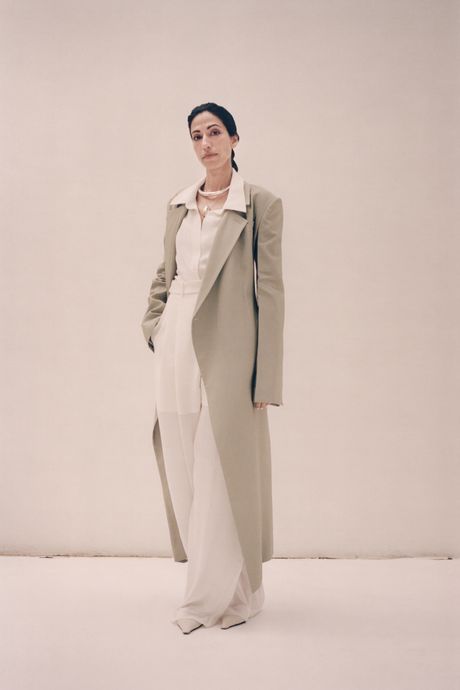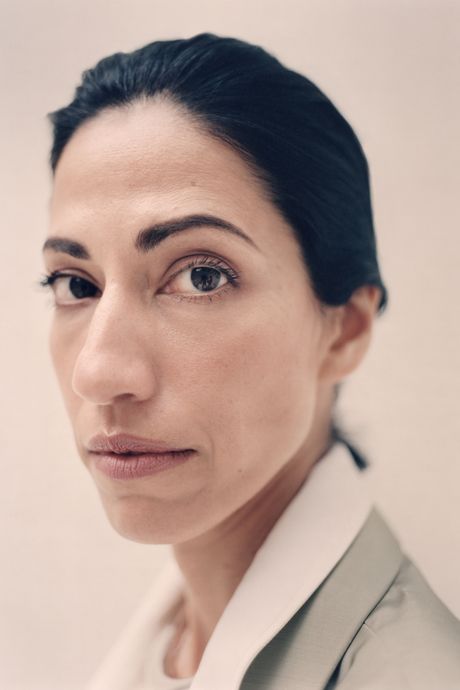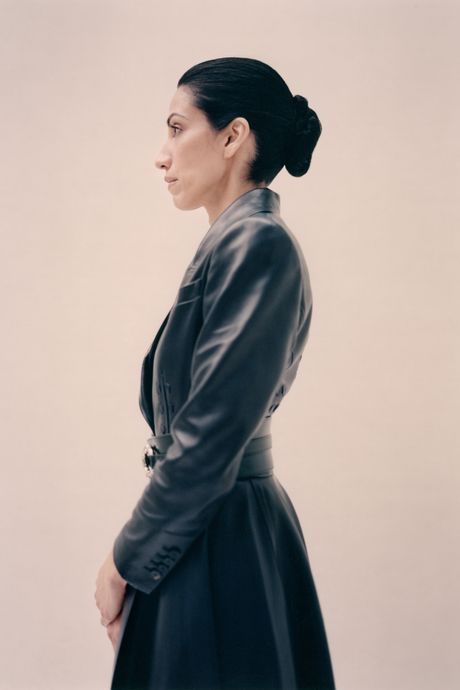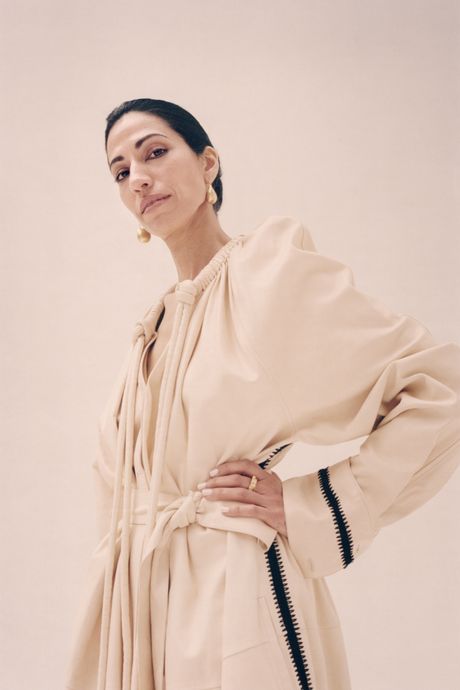Throughout a public career and marriage, the political confidante has remained an enigma, until now.
Huma Abedin and I have arranged to meet in a Westchester parking lot at 10 a.m., and I’m stuck in traffic on the West Side Highway, 31 miles away. Abedin is a lot of things, but first and foremost she has been, for 25 years, the keeper of details, optics, and logistics for Hillary Clinton. She knows it takes 90 minutes to do Hillary’s hair and makeup and about ten minutes to walk briskly from Hillary’s old Senate office to the floor. She has wrangled visas, commissioned airplanes, and organized clandestine meetings between Hillary and Barack Obama involving spy-ops tactics (decoy cars and Hillary lying flat in a back seat). No one better comprehends the value of an on-time arrival than Abedin. Now Siri is recalculating my arrival time, again. East Side, West Side, the roads are a mess. Is it possible that Abedin is stuck in this, too?
At 10:01, a text comes through. “Lisa it’s Huma. I’m here in the parking lot.”
When at last I reach the Visitor Center at the Rockefeller State Park Preserve, I’m nearly half an hour late, and Abedin is standing by her Kia SUV with her phone to her ear. In blue leggings and a white Lululemon puffy, she looks less like her legend — the floral frocks, the red lip, the Disney-princess tresses — than like any mom at private-school pickup. I apologize profusely, and Abedin performs a conversational feint that puts me at ease. No, she insists, deferentially, I gave her a gift: found time and the chance to complete a work call, “which, honestly, I would have been a little anxious about.” But, incidentally, she had encountered no traffic on the trip upstate. The ride went perfectly, she says.
As we approach the trailhead, Abedin pulls out her phone, on which she has two routes mapped out. These were recommended to her, as was this park, by Hillary Clinton, whose Chappaqua home is ten minutes away. There’s a small loop around Swan Lake, which Clinton suggested we do twice, or a larger one offering foliage views. “It’s so beautiful,” Abedin says cheerily, as we head toward Swan Lake. Clinton was “a hundred percent right. She should get credit for advancing this.”

Peter Do coat, shirt, and pants. Kwaidian Editions mules. Sophie Buhai collar and pendant. Photo: Andreas Laszlo Konrath
In one week, Scribner would release Abedin’s memoir, Both/And, a 500-page political and personal coming-of-age tale. The book takes readers through her earliest life in Kalamazoo, Michigan, raised in an Indian-Pakistani household; to her upbringing in Saudi Arabia, with summer vacations in Queens; to the day, 25 years ago, she first walked into the White House as an intern, a year after Monica Lewinsky. From the moment she commanded a crew member to fish the First Lady’s garment bag out of the East River with a broomstick, Abedin proved herself indispensable. She mentions the day, a few months later, when Bill Clinton was impeached for lying under oath and obstructing justice, and the moment, 12 years after that, when the former president, remediated, officiated at Abedin’s wedding to Anthony Weiner, then a rising congressional representative of Brooklyn and Queens and not yet a convicted sex offender. “We’ve never loved a human being outside our family as we love Huma,” the former president said then. There followed the humiliating public disintegration of her marriage and then the epic rise and fall of Hillary Clinton, together with the destruction of nearly every assumption about our political and national reality.
Abedin was a witness to and participant in all this tumult but never the narrator of it. “When the TV cameras were swarming at events, I knew exactly where to linger to be close enough to help but just outside the camera’s frame,” she writes. Why would this mute guardian of secrets and schedules be compelled to write an autobiography? This answer, in large part, is Jordan, her son with Weiner. He is 9, and Abedin is mindful of the short span between now and his unfettered access to the internet. There’s so much of the record she wants to correct. The memoir is a chance — after a lifetime as the trusted and silent helpmate — to assert herself. “I liked being an invisible person, but I felt like if I didn’t write my story, somebody else is telling my history,” she says to me.
Her friend Anna Wintour suggested she write the book a few years ago, and now, at age 45, she’s ready to tell her version of what happened. “I want to be able to say yes, to steal from Shonda Rhimes,” Abedin says. After the 2016 election, when Abedin was so gutted she wished she could stay in bed some days, it was Wintour who had come to her rescue, saying, “‘We’re going to the theater for a random movie and we’re going to go eat.’ And just being out and being with her, I just felt sort of normal and loved.” Abedin is still Hillary Clinton’s chief of staff: Wintour and Clinton are co-hosting her book party — tough billing for a new solo act. As Abedin observes in her book, “When your life entails traveling with a Clinton, it is hard for any other star to shine.”
Still, Abedin doesn’t abandon caution easily. At a fork in the trail, I suggest we veer off the prescribed route, and she offers a warning before she assents: “I did confirm with a few of the people who’ve walked here” — one of Clinton’s Secret Service agents, it turns out — “that you can get lost.” And then in the next breath, “But that’s okay. I feel like there’s plenty of people in the park that we can get directions from.” Abedin doesn’t like to leave anything to chance. “I need to have some sense of control of what’s happening around me — and I’ve tried to figure out why I am this way — and I think it’s because so much of my life is out of my control. So what I can control, I try.”

Peter Do coat and shirt. Sophie Buhai dream collar. Photo: Andreas Laszlo Konrath
If you’re looking for fresh Clinton World gossip in Both/And, you will have to read it with a powerful microscope. There’s a scene, coinciding with the congressional vote to move forward with impeachment hearings when Hillary, at a fundraiser, is so stressed that she lashes out at Abedin for not fixing her a plate; Abedin describes her standing in the buffet queue and then slamming her dish, saying grimly, “This is not working.” There’s young Chelsea, giving Abedin gifts on both Christmas and Eid — “the first and last time any non-Muslim friend made that gesture.” And, most poignantly, there’s Hillary following the election returns at the Peninsula hotel on November 8, 2016, when, just after 10:50 p.m., she says out loud, “Can someone explain to me what is happening?”
Mostly, Abedin’s account is one of the loyal servant defending her boss while burnishing her legacy — contextualizing Hillary’s 2002 Senate vote to invade Iraq, for example, and standing up against the critique that she isn’t “likable.” It’s only when Weiner enters the picture in the second half of the book that Abedin emerges as a protagonist in her own story: a woman of astonishing mettle, with old-fashioned ideas about romance and marriage, whose job is her whole life and who gets blindsided by a man she loves.
It’s like you’ve written two books, I observe on our walk, and in the second, “your voice literally changes and you stop being — ”
“Careful?” Abedin interrupts.
Weiner, 12 years her senior, pursued Abedin for years. From the day he learned she was a religiously observant Muslim, she never saw him take a drink. Weiner proposed on his knee downstairs at the Gramercy Park Hotel. Abedin was 32 and inexperienced with men: “As was expected of any girl with my background, I would lose my virginity to the man I would marry.” When Weiner presented her “with the most beautiful piece of jewelry I had ever held,” Abedin writes, “we embraced, and I closed my eyes feeling a euphoria I had never experienced before.”
Abedin discovered her new husband had a problem on her return from Islamabad, where she had accompanied Hillary, then secretary of State, on a diplomatic mission to smooth any ruffled feathers after the American assassination of Osama bin Laden. While she was abroad, Weiner had mistakenly posted a photo of his erection in his underwear on Twitter. He deleted it, the press discovered it, then he lied to everyone, including his wife, claiming his Twitter had been hacked. When a week later Weiner told Abedin the truth, it was she who advised her husband to come clean to his top aides in Congress and to start arranging a press conference. She accompanied him to meetings with lawyers and crisis managers, rode with him to his press conference and then, once settled in the hotel room they were staying in to avoid the paparazzi, ordered food for the friends and family who came to support them. Abedin, in other words, staffed her own marital crisis.
It all went downhill from there, of course: Weiner’s resignation from Congress under pressure; therapy; his attempted political resurrection as a candidate for mayor of New York; the relapse under the avatar Carlos Danger; Abedin’s own press conference supporting her spouse; the emergence of a woman named Sydney Leathers, who took her sexts with Weiner public; more therapy; the porny selfie taken with 4-year-old Jordan asleep in the bed; explicit exchanges with a minor; rehab; and finally Weiner’s sentence of 21 months in a federal prison. All this time, Hillary was rising, aiming for the White House with Abedin as her most-trusted aide. The more Weiner screwed up, the more he put the nation at risk, for as much as the Clintons loved Huma, Hillary was running against Donald Trump and there was only so much reputational damage she could sustain. In October 2016, a week and a half before Election Day, the FBI announced it had found a trove of messages between Clinton and Abedin on Weiner’s seized laptop, causing them to reopen the investigation into Hillary’s use of private email. The new emails didn’t change the FBI’s conclusions, but it didn’t matter: Trump seized the chance to cast his opponent, again, as corrupt and scheming.
Even before her wedding, Abedin had built a cult following with her beauty, her competence, and her silence. Each humiliation was thus a tabloid scoop, and the gossips wondered out loud why she was continuing to carry on with this loser. Once-loyal friends abandoned her, isolating her further, and her reflex to tough it out was reinforced by her professional responsibilities, which required almost inhuman physical endurance and psychic reserve. “In hindsight, I was in extreme trauma,” Abedin tells me. After the Carlos Danger debacle, “we were kind of in it alone. We didn’t really have anyone to talk to, aside from whichever therapist we were seeing.” It was then that Anna Wintour swooped in, offering Abedin a vision of an alternate life: Wintour introduced her to “writers, people in the fashion world. Mostly people who just weren’t really into politics.” Wintour gave Abedin what she calls “a safe space.”
Today, she argues no one knows another’s marriage, and it’s useless to judge when betrayal, addiction, and mental illness are as common as dirt. “It’s hard to have this conversation with a lot of girlfriends, because their experience is not similar to mine,” but Weiner was — and still is — a good partner, she says. Throughout their marriage, “he made my life so much easier. He did everything. He did our shopping. He cleaned our house. He made sure the laundry was done.” When they fought, Weiner told Abedin he felt like the “house manager, and it always shut me up because I had to concede it was true,” she writes.
Abedin separated from Weiner in 2016, filed for divorce, then withdrew that filing. “I had my heart broken, dragged out, stomped on, humiliated. I lived with shame, in shame, for so long,” she tells me. “On the one hand, you have this person who’s making your life so easy. On the other hand, you have this person who’s doing these deeply irresponsible things, and what felt to me like very, very selfish things, and taking us down.” While Hillary Clinton was the Democratic nominee for president, Children’s Services was investigating the Weiner-Abedin household to ensure that they — the exhibitionist father and the mother running a national campaign — were good-enough parents. Abedin would come home from a high-level planning meeting to social workers in her apartment peering through her closets and into her refrigerator.
Are you divorced? I ask Abedin. After Trump won and Weiner was released from prison, the couple embarked on a long, restorative therapeutic process. Abedin had always resisted therapy before — being emotionally open was antithetical to keeping secrets — but now she saw that while her marriage was over, “my relationship with my child’s father is not, and never will be,” she writes.
“We are in the final stages of our divorce,” she answers. “Lawyers are doing their lawyer thing.” Weiner lives in her building, “very nearby.”

Alexander McQueen coat and belt. Photo: Andreas Laszlo Konrath. Coat and belt by Alexander McQueen.
Abedin frames Both/And as a tribute to her roots, especially to her father, who died when she was 16. She mentions frequently how her intellectual parents raised their four children, including their daughters, to make their own choices and to believe that they could accomplish anything.
Between the lines, though, emerges a different story, of a girl schooled early in the pragmatic, old-world feminine arts. She served tea to her father each afternoon promptly at five (and was rebuked if she missed a day), and she helped him with secretarial jobs: faxing, typing, proofreading, and making airline reservations. In a frontispiece to the book, Abedin reprints her father’s advice in a handwritten note: “Whatever the provocation it should not influence you to act in an unbecoming manner.”
This was perfect training for the White House internship and, later, political staff. Abedin was skilled, poised, uncomplaining. She carried luggage. She went with Hillary to pick out flattering pantsuits and made her ugliest garments disappear — among them “the Michelin Man coat, a long, heavy pleather thing with a stamped animal print and a thick faux-fur lining that added considerably to the wearer’s girth.” Her deferential graciousness extended not just to Hillary but to everyone whom Hillary touched, so that when they were on a rooftop in Iraq with Senator John McCain, with the television cameras about to roll and McCain’s comb-over flapping in the breeze, Abedin approached him with Hillary’s hair brush and hairspray to gently pat it into place. What classified intelligence Abedin possesses, what strategic advice she has meted out, the parameters of her own ambition — none of this is part of her story.

Proenza Schouler dress. Khiry earrings. Prounis ring. Photo: Andreas Laszlo Konrath
At a moment when every working female is reexamining her relationship with power and her exclusion from it, Abedin doesn’t grapple sufficiently with how that power seduced her and how she colluded with it. She and Hillary have this in common, an unexamined fidelity to the status quo — even as they have come closer than anyone in American history to dismantling it. Instead, Abedin trips over herself demonstrating her gratitude. “It seemed I was everyone’s girl Friday, and I didn’t mind it one bit,” she writes early on. Her awe extends even to Weiner. She writes: “I always presumed Anthony was busier than me — after all, he was an elected member of the House — so usually I waited to hear from him.” When she went out in public with him, she tells me, he was the draw and she was —
“Arm candy?” I ask.
“Yes!” she replies.
There’s a line in Both/And that haunts me. It operates as a kind of disclaimer in the run-up to her marriage. “I was in the midst of what I believed was a deep, true love affair. Nothing in my experience could possibly have prepared me for what was to come.”
But of course that isn’t true. Abedin was working for Hillary Clinton when the Monica Lewinsky scandal erupted. She was carrying Hillary’s bags, and making her plates of food, and handing her speeches at the very moment it became clear that the woman she most admired was being lied to by her husband who had a narcissistic, self-destructive thing about sex. The parallels are almost too on the nose. And yet when I ask Abedin about how much she and her close friend and confidante Hillary Clinton ever talked about the analogies in their personal stories, Abedin responds, “Zero.”
Having veered off the path, we now have to find the parking lot, and Abedin navigates with the map on her phone. We head downhill, turn left, miss the exit, and double back until we see the parking-lot sign. “See! We did a loop basically,” Abedin says. “I’ve got to tell my boss. She will be so proud of us.”
PRODUCTION CREDITS
- Photographs by Andreas Laszlo Konrath
- Styling by Jessica Willis
- Hair by Edward Lampley
- Makeup by Frank B at The Wall Group
- Tailoring by Lindsay Wright
- Stylist assistants: Roberto Johnson and Vivian Chuang
This article appeared in the November 8, 2021, issue of New York Magazine.